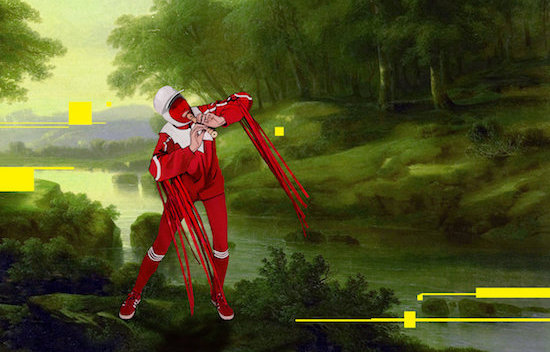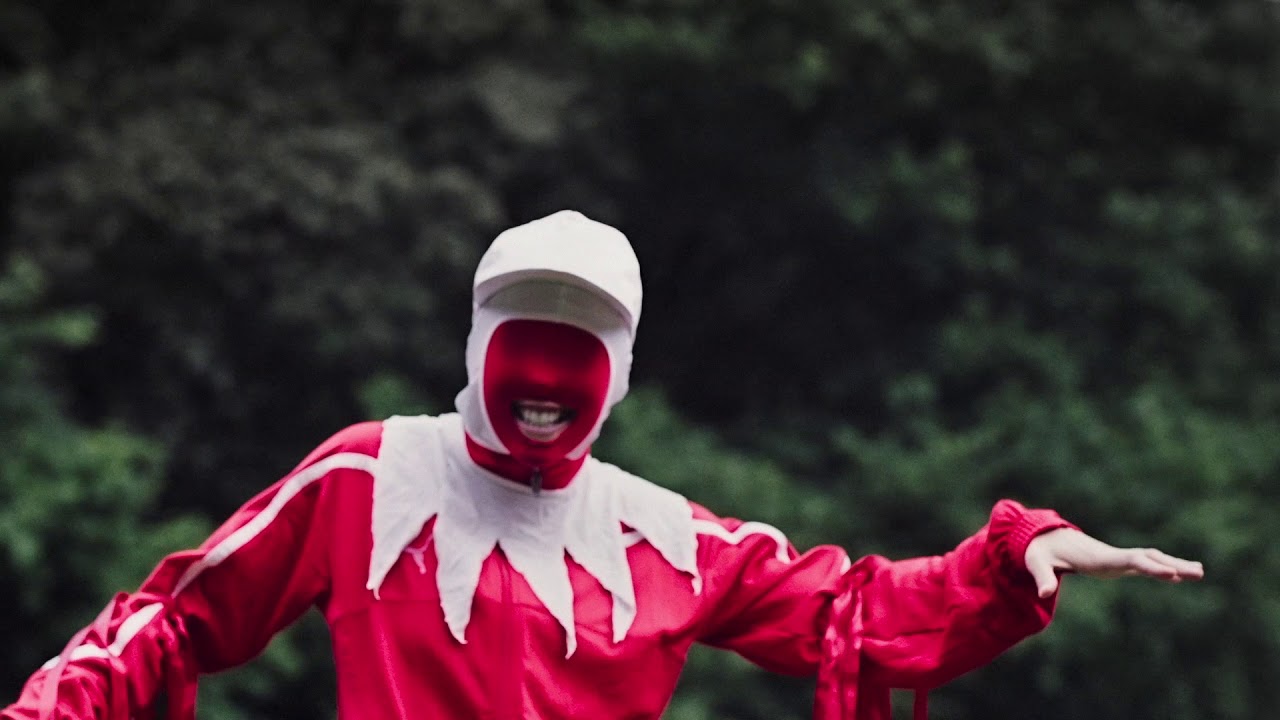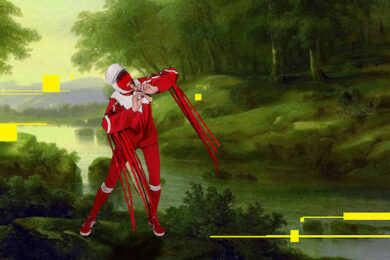England is heading into a future that resembles a vast, drab and malfunctioning Westworld-style amusement park run by G4S in brand synergy partnership with Home Bargains, Wetherspoons and Sky News. Our cultural algorithms are infected with bugs and fascist malware, as the cricket lawns, warm beer and invincible green suburbs are overrun by fascist Border Patrol snatch squads and Stella-fuelled EDL hunter-killer swarms. The countryside has become a Nuts in May Beyond Thunderdome hellscape as middle-class hordes, fleeing falling property prices, coalesce into feral tribes defending their second homes and stocks of Waitrose-brand quinoa against YouTube drill crews while morris dancers hunt Polish migrant workers for sport at the behest of demagogues wearing Jacob Rees-Mogg and Kirstie Allsopp masks.
Into this nightmare appears Gazelle Twin, a lone figure, a jester resplendent in Adidas red tassels and a white baseball cap. A canary in the disused coalmine, this jester has been assembled from shards of historical junk to pass judgement on England and the laughable, horrifying shitshow it has become. That judgement is Gazelle Twin’s new album, Pastoral.
As Gazelle Twin, Elizabeth Bernholz has long attempted to lift the bonnet of contemporary British life and gaze into its filthy workings. Her 2014 album Unflesh explored, with unsettling wobbly electronics and dance videos, the spread of technology into everyday life and how this enables capitalism to manipulate our sense of embodiment in time and space. This was taken a stage further in 2017 with Kingdom Come, an audiovisual show inspired by the JG Ballard novel of the same name, an ominous tale detailing how modern consumerism ushers in a very British style of Bluewater Mall fascism.
It is Ballard who can be recognised as the soothsayer overlord of our postmodern world, whose novels and short stories have provided a cognitive and material map for our current malaise. Ballard is a deep well of inspiration for Bernholz: “All of these books capture a sense of dread with the world, particularly the very deep human tendency towards tribalism and ultra-violence,” she said in a tQ interview on the Kingdom Come show. “He unpicks the elements of it, the anatomy, and traces the ancient traits within us and how they keep on applying to the contemporary world. I really just like to get under the skin of those ideas, because they are bizarre, and uncomfortable.”
Bernholz picks away at the bucolic, Constable-generated image of English countryside like a fetid scab. The sense of wrongness is telegraphed in the album’s cover art, depicting a bastardised version of all those fusty and worn Deutsche Grammophon records of Beethoven and Vaughan Williams that clog up the baskets in smalltown charity shops. From here, Gazelle Twin squarely puts her bell-tassled boot into the neo-nationalist idea of modern England. Pastoral may be an album of satire, but it’s not the cheery-pallid rural parody of Cold Comfort Farm, Five Go Mad In Dorset or even Hot Fuzz. Gazelle Twin’s Pastoral jester bares its teeth with glee; its smile is part Punch and part the grotesque little homunculus of Aphex Twin’s ‘Come to Daddy’.
Bernholz takes many of the sonic motifs that are emblematic of wholesome English ‘high culture’ and ‘tradition’, from folk song and early music to classical music and penny-operettas, then splices them together with corroded structures and synthetic electronics; it’s reminiscent of the rave clash of the urban/suburban and rural ways of life in the 90s rave era. ‘Folly’ and ‘Throne’ contain woodwind instruments that seem to run on a sickly loop at half speed, while ‘Dance with the Peddlers’ has a squealing riff played on a recorder (the instrument of many a torturous music lesson) with a industrial trap beat. On ‘Jerusalem’, there’s ghostly wisps of school choirs and sandblasted ambient dance music, while a curtain-twitching Neighbourhood Watch droog calls to report an abandoned vehicle and a wheezy Punch exclaims “That’s the way to do it!”
This clash of chintz and plastic with heritage and folklore generates an idyllic simulacra with unspoken threats and amoral bestial passions under the surface. Bernholz electronically manipulates her voice to articulate those passions, inhabiting damaged and monstrous characters spewing out scraps of thought and association to the point of delirium. There is the jabbering Daily Mail reader, a bulging temple vein full of racist and homophobic resentment, in ‘Better in my Day’. “Just look at these kids now / No respect / No proper job / Much better in my day / No locked doors / No foreigners,” it spits, above industrial beats and a trilling flute line. You have the seething vitriol in ‘Little Lambs’, where we hear the repressed fury of English queues (“Go ahead jump the line / No that’s just fine / That’s just fine / CHAR-CHAR-CHARMING!”). The overblown folk operatics in ‘Old Thorn’ and ‘Sunny Stories’ are at odds with the metallic inhuman rasps of ‘Mongrel’ and ‘Hobby Horse’, which come complete with hollers of “En-ger-land!” in the distance. The religious wastelands and crusading battlefields hinted in ‘Glory’ are wound up with gothic overtones of warped harpsichords, heaving martial thrums and cavernous vocals.
What emanates from Pastoral is a sense of England as a once powerful force – a place that used to imagine and propose all sorts of societies, good and bad, from socialist to Thatcherite – that has curdled into a toxic sludge of despair and suspicion. ‘Dieu Et Mon Droit’ is named for the motto of the British monarchy, but looks at a very different manifest destiny – “Eating from bins outside supermarkets / Kicked into the curb like empty coke cans / Become numb / Take nothing else for granted / Stay awake all the time / Never have a break”; whoever sits at the ‘Throne’ in the following track resemble hideous, disfigured archons, bloated by debt and riddled with disease.
Pastoral is a disquieting listen, especially for those who think we can harness any ideas of ‘the nation’ for a progressive good. Those ideas are instead the basis of a Brexit-accelerated reactionary turn that believes Middle England is under threat and must be protected (and kept white) at all costs. Gazelle Twin shows us that any romantic idea of England is a poisoned chalice, at best, and Pastoral’s jester is the fool who skips along with us towards a looming dark age.




